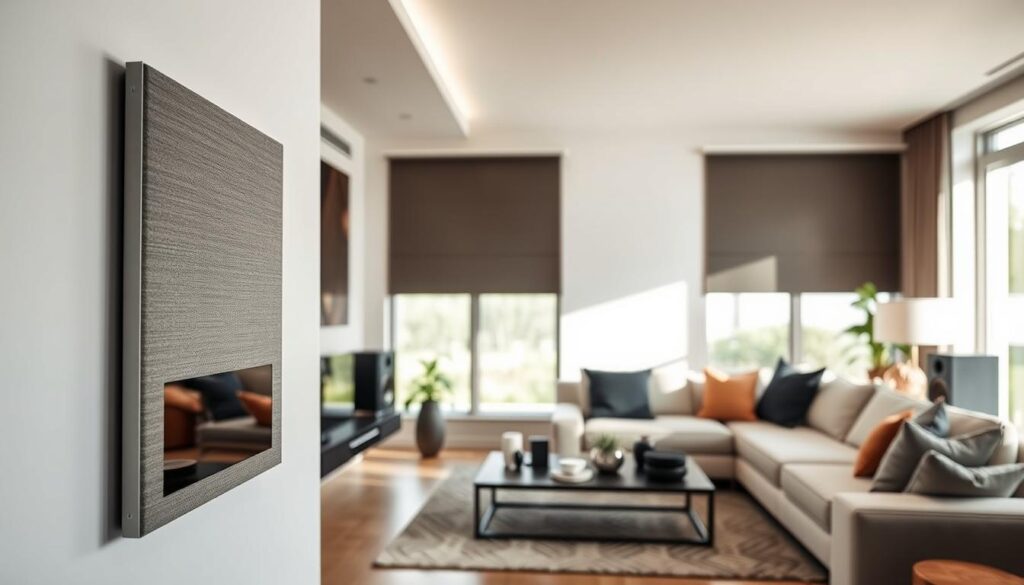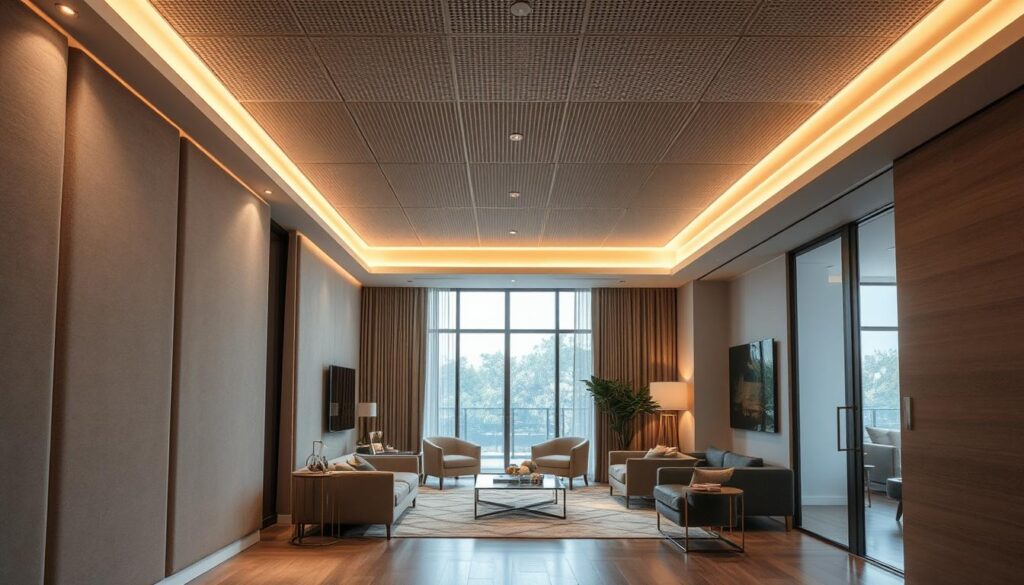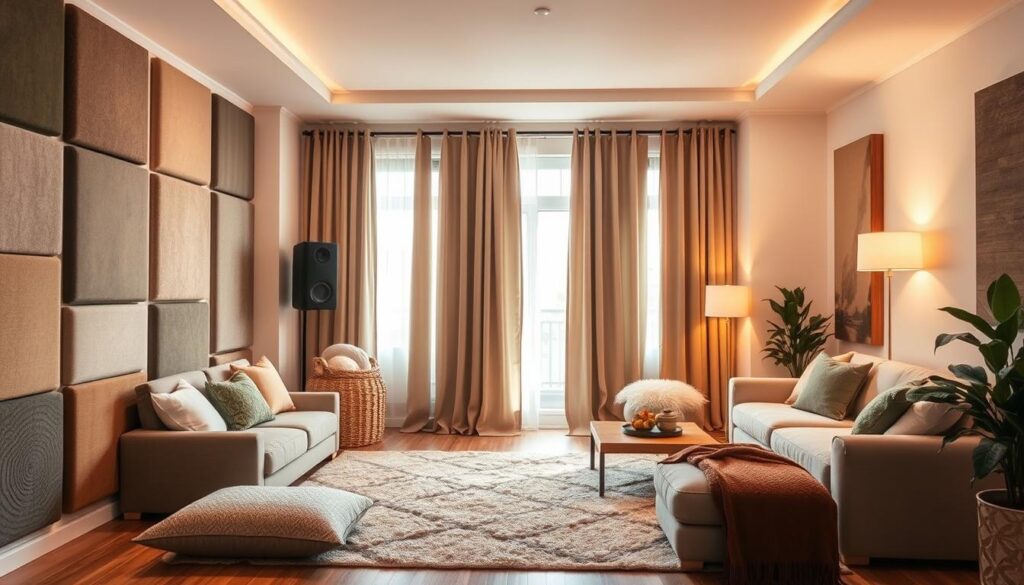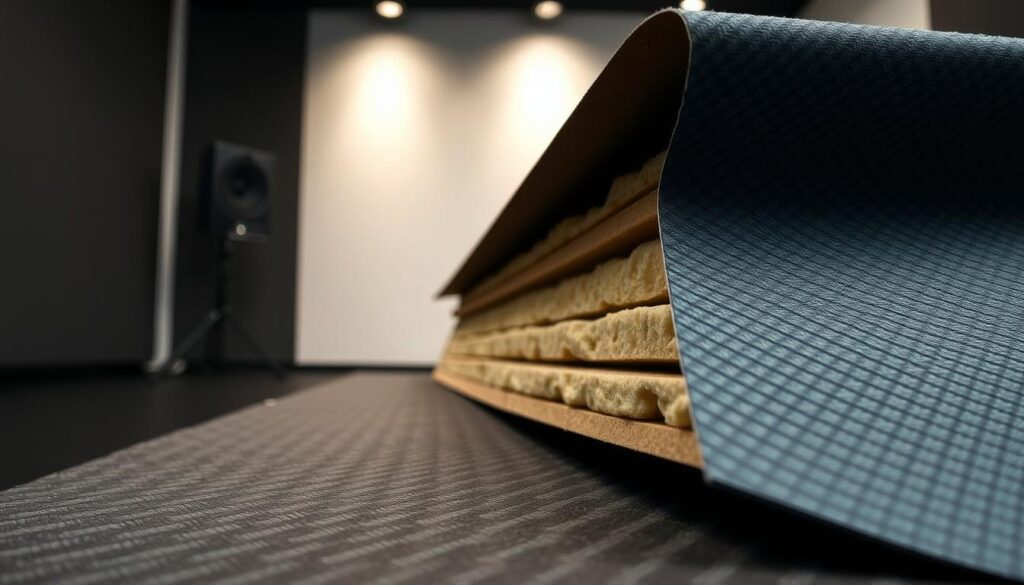When you set up a smart home, you’re excited about the ease and new features it brings. But, with more smart devices, soundproofing becomes a big issue. It’s harder to keep your home quiet.
But, there’s a way to make your home quieter and more comfortable. By using soundproofing solutions with your smart home tech, you can do just that. Smart blinds and sound systems can help make your home quieter.
Adding these solutions can make your home more private and valuable. It also makes your living space more peaceful. So, when you’re upgrading your home with smart tech, think about soundproofing too.
Understanding Soundproofing Basics
To make your smart home quieter, you need to know how soundproofing works. It’s about making your home quieter and more peaceful. This makes your living space more comfortable.
What is Soundproofing?
Soundproofing means making less noise in your home. It stops sound from getting in or out. This is done with special materials and methods.
The Source-Path-Receiver method is key. It helps you find and fix the noise problem. You learn where the noise comes from, how it travels, and where it’s heard.
Types of Soundproofing Materials
There are many soundproofing materials, each with its own use. Some common ones are:
- Acoustic panels: They soak up sound, cutting down on echo and reverberation.
- Soundproofing blankets: These are heavy blankets that cover walls, ceilings, or doors to block noise.
- Mass Loaded Vinyl: A vinyl sheet filled with metal to dampen sound.
- Acoustic caulk: A special sealant for gaps and joints to stop sound leaks.
| Material | Description | Application |
|---|---|---|
| Acoustic Panels | Absorbs sound waves | Walls, Ceilings |
| Soundproofing Blankets | Reduces noise | Walls, Doors |
| Mass Loaded Vinyl | Dampens sound | Walls, Floors, Ceilings |
Benefits of Soundproofing Your Home
Soundproofing your home has many benefits. It makes your life better and can even increase your home’s value. Some main advantages are:
- Reduced Noise Pollution: A quieter home.
- Improved Privacy: Keeps sound in or out.
- Enhanced Home Value: Adds value to your home.
- Better Sleep: Quieter homes mean better sleep.
Knowing about soundproofing and using it with smart home tech makes your home better. It becomes a peaceful and secure place. Soundproofing and smart home features together make your home a perfect retreat.
The Rise of Smart Home Technology
Smart home technology is changing how we live, giving us control over our homes like never before. It makes our homes more comfortable, convenient, and safe. This change is making our lives better.
Smart home devices lead this change, offering solutions for different home needs. They include thermostats that learn your temperature preferences and lighting systems that adjust based on the time of day. These devices aim to simplify and improve our lives.
Overview of Smart Home Devices
Smart home devices cover a wide range, like voice assistants, security cameras, door locks, and entertainment systems. You can control them from your phone or tablet, letting you manage your home from anywhere.
Some top smart home devices are:
- Amazon Echo and Google Home for voice control
- August smart locks for better security
- Philips Hue for smart lighting
- Nest for smart thermostats
These devices not only make your home more functional but also help save energy and resources.
How Smart Technology Enhances Living Spaces
Smart technology lets you customize your home to fit your needs. For example, smart lighting can set the mood for any occasion. It can make your home perfect for dinner or a relaxing evening.
Smart tech also works well with soundproofing to make your home quieter and more private. By combining these upgrades, you can enjoy a more peaceful and comfortable home. For more on how smart tech is changing renovations, check out this link.
| Smart Home Device | Functionality | Benefits |
|---|---|---|
| Smart Thermostats | Temperature control | Energy efficiency, comfort |
| Smart Lighting | Lighting control | Ambiance, energy savings |
| Smart Security Cameras | Home security | Enhanced security, peace of mind |
In conclusion, smart home technology is changing our lives for the better. It offers many benefits that improve our living spaces. By understanding what smart devices can do, we can make our homes better.
Combining Soundproofing with Smart Home Features
The mix of soundproofing and smart home tech is changing how we enjoy quiet at home. It’s not just about cutting down noise. It’s about making your space both cozy and high-tech.
The Synergy of Sound and Smart Tech
When you blend soundproofing with smart home gadgets, you get a strong team-up. Noise sensors can spot noise and start actions, like changing smart windows or turning on acoustic panels. This team-up makes your soundproofing better and more flexible.
Using smart home tech, you can set up soundproofing to work on its own. For example, smart curtains can close when it’s loud, and smart panels can change how they soak up sound. This keeps your home quiet and comfy, no matter what.
Examples of Integrated Solutions
There are many ways to mix soundproofing with smart home tech. For example, you can put soundproofing stuff with smart sensors to watch and tweak soundproofing as it goes. Some cool examples include:
- Smart acoustic panels that change how they soak up sound based on the noise around.
- Soundproof windows with built-in noise sensors that adjust to block out more noise.
- Soundproofing systems that you can control from your phone through smart home apps.
These combos make soundproofing better and add ease and flexibility to your smart home. By using these techs, you can make a peaceful and modern home.
Assessing Your Soundproofing Needs
It’s key to know the soundproofing challenges in your home to pick the right solutions. You need to look at your living space closely. This helps find where noise is coming in or going out.
Evaluating Noise Levels in Your Home
First, check the noise levels in your home. You can do this by doing an acoustic assessment. Look at the room’s features, like flooring, walls, and windows. Also, think about the noise sources, like family members or pets, and outside noises.
Steps to Evaluate Noise Levels:
- Identify the sources of noise.
- Measure the decibel levels in different rooms.
- Note the times when noise is most prevalent.
Identifying Problem Areas
After knowing the noise levels, find the problem spots in your home. These might be doors, windows, or wall gaps where sound leaks. Inspecting your home thoroughly will show you where to use soundproofing materials best.
| Problem Area | Soundproofing Solution | Benefits |
|---|---|---|
| Gaps around doors and windows | Sealants and acoustic caulk | Reduces noise leakage, energy-efficient |
| Thin walls | Acoustic panels or additional insulation | Improves sound absorption, enhances privacy |
| Outdated windows | Smart windows or double glazing | Significantly reduces external noise, improves energy efficiency |
By understanding your soundproofing needs, you can choose the best solutions. Adding smart home tech can make your space even better. It lets you control your soundproofing easily.
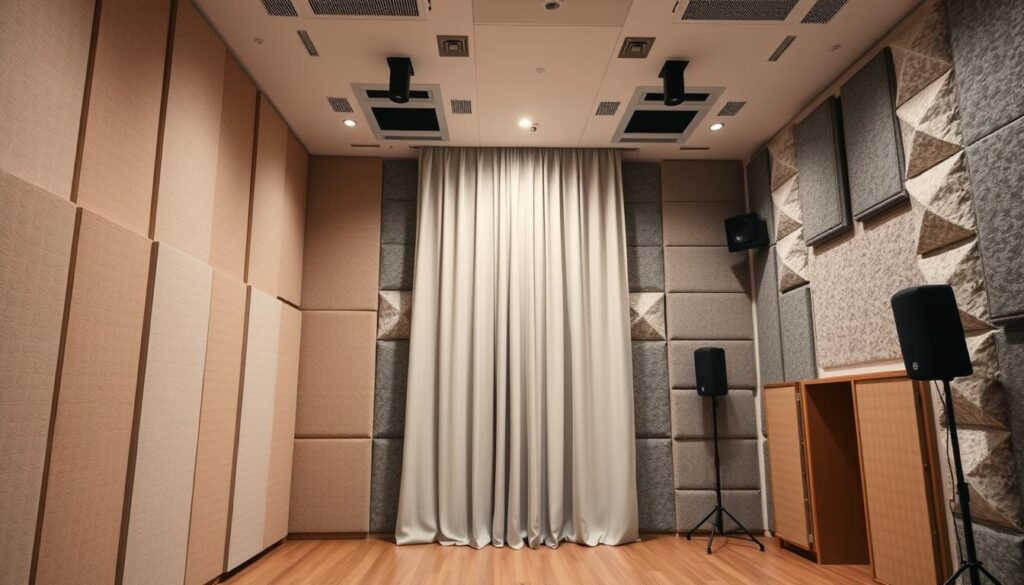
Smart Soundproofing Solutions
Smart home tech is changing how we manage noise. Now, you can use smart soundproofing solutions that cut down on noise. They work well with your smart home system.
Acoustic Panels with Smart Features
Acoustic panels are key for soundproofing. With smart tech, they now have active noise control like top-notch headphones. This means a quieter space without losing your home’s look.
These smart panels can be controlled by your phone or smart home assistant. You can adjust them for different situations. For example, turn them on during a meeting or when you want to relax.
Smart Windows and Doors for Noise Reduction
Windows and doors let in noise. Smart windows and doors for noise reduction can make your home quieter. They work with your smart home system to control noise levels.
Some smart windows have electrochromic glass that changes from clear to dark. This reduces noise and controls light. Smart doors have advanced seals to block sound.
Adding these smart solutions makes a full sound management system. It improves your living space.
The Role of Noise Monitoring Systems
Looking to make your home quieter? Noise monitoring systems are key. They help find and fix noise problems. This makes your home quieter and more peaceful.
Understanding Noise Sensors
Noise sensors are the heart of these systems. They track and measure sound in your home. This gives you info on what’s making the noise, like traffic or appliances.
Advanced noise sensors can even tell you the exact sound. This helps you find and fix the noise source.
Using noise sensors has many benefits:
- They monitor sound levels in real-time.
- They find out where the noise is coming from.
- They analyze data to show noise patterns.
Integrating Sensors with Smart Home Systems
Linking noise sensors with your smart home takes it to the next level. It lets you control soundproofing automatically. For example, it can adjust panels or windows based on sound levels.
Smart soundproofing solutions can also change based on noise. Like sealing windows during busy times to block out noise.
This mix of noise monitoring and smart home tech is a new trend. It makes soundproofing better and your home more comfortable.
Automating Your Soundproofing Measures
Automating soundproofing is a big step up for managing sound at home. Smart home tech makes it easier and more efficient. It makes your home quieter and more comfortable.
Smart Curtains and Blinds
Smart curtains and blinds are a smart way to block sound. They adjust to outside noise, keeping your home quiet. You can set them to close when it’s loud or during certain times.
- Automated noise reduction
- Programmable for peak noise hours
- Integration with smart home systems
Adjustable Acoustic Treatments
Adjustable acoustic treatments add another layer of sound control. They can be set to absorb or reflect sound, fitting your needs. With smart tech, you can change them from anywhere or set them to adjust on their own.
Key benefits include:
- Enhanced sound absorption
- Flexibility in different environments
- Remote adjustment capabilities
By mixing smart home tech with soundproofing, you get a top-notch sound system. It’s easy to use and adjusts in real-time. Your home stays a quiet, peaceful place.
Choosing the Right Smart Products
When you mix soundproofing with smart home tech, picking the right products is key. The success of your soundproofing system depends on several things. These include the noise type, your home’s layout, and your budget.
Factors to Consider in Smart Soundproofing
To pick the best smart soundproofing products, think about a few important factors. These are:
- The level of noise you want to cut down
- The type of noise (e.g., airborne, impact, or structural)
- The size and layout of the room or area
- Your budget for the project
- The level of smart technology integration you desire
Noise Sensors are key in smart soundproofing systems. They watch and adjust sound levels as they happen. When picking noise sensors, look at their sensitivity, accuracy, and if they work with your smart home system.
| Feature | Basic Noise Sensor | Advanced Noise Sensor |
|---|---|---|
| Sensitivity | Low to Medium | High |
| Accuracy | ±5 dB | ±1 dB |
| Smart Home Compatibility | Limited | Highly Compatible |
Comparing Brands and Technologies
With many brands and tech options out there, it’s important to compare them. Think about these when looking at different smart soundproofing products:
- Brand reputation and customer reviews
- The technology used (e.g., IoT, AI, or traditional soundproofing materials)
- Integration capabilities with your existing smart home system
- The level of customer support provided
By carefully looking at these factors and comparing brands and tech, you can make a smart choice. This choice will meet your soundproofing needs and improve your smart home experience.
Installation Considerations
Getting your soundproofing and smart home systems installed right is crucial. It ensures they work well together. When you’re setting up soundproofing materials for smart homes, how you install them greatly affects your smart home’s performance.
DIY vs. Professional Installation
You can choose between DIY installation or hiring a pro. DIY installation saves money and lets you control the process. But, it takes a lot of time and technical know-how to do it right.
Professional installation brings the benefit of expertise. Pros can figure out what you need, suggest the best materials, and install everything efficiently.
Tips for Effective Soundproofing Integration
To get the best out of your soundproofing and smart home setup, keep these tips in mind:
- Make sure your soundproofing materials work with your smart home devices.
- Plan your installation carefully, considering your home’s layout and soundproofing needs.
- Use noise sensors to check noise levels and tweak your soundproofing as needed.
- Think about linking your soundproofing solutions with other smart home features, like lights and temperature, for a complete smart home system.
By following these tips and picking the right installation method, you can enjoy a quieter and more comfortable home.
Maintenance of Your Smart Soundproofing System
To keep your smart soundproofing system working well, regular maintenance is key. This means doing routine checks, updates, and adjustments. It helps your system run smoothly.
Regular Checks and Upkeep
Cleaning and checking the sensors regularly is crucial. Dust and debris can mess with sensor accuracy. Inspect your sensors every few months and clean them when needed.
It’s also important to watch how your smart soundproofing system is doing. Check for software updates and make sure everything works together. Regular checks can spot problems early.
Updating Software and Hardware
Keeping up with the latest in soundproofing technology trends can make your system better. Manufacturers often update software to improve performance or add new features. Updating your system’s software regularly is key for its efficiency and security.
Also, as home automation with soundproofing gets better, new hardware can offer more benefits. Think about upgrading your hardware every few years. This way, you can enjoy the latest in soundproofing tech.
By focusing on maintenance and keeping up with new tech, your smart soundproofing system will stay effective. It will also keep improving your living space.
Future Trends in Soundproofing and Smart Technology
Looking ahead, soundproofing tech is set to change how we handle noise at home. The mix of soundproofing with smart home tech is getting better. New ideas are coming that will make your home life better.
Emerging Innovations
New stuff is being made to block sound better. Think advanced acoustic panels and smart windows that adjust to noise. Keeping up with soundproofing tech trends helps you get ready for these new things. They’ll make your home more comfy and private.
Integrated Systems of the Future
Soundproofing and smart home tech will get even better together. Soon, we’ll have systems that manage sound better and easier. This could even make your home worth more. By going for these new techs, you’ll make your home a happier place.
